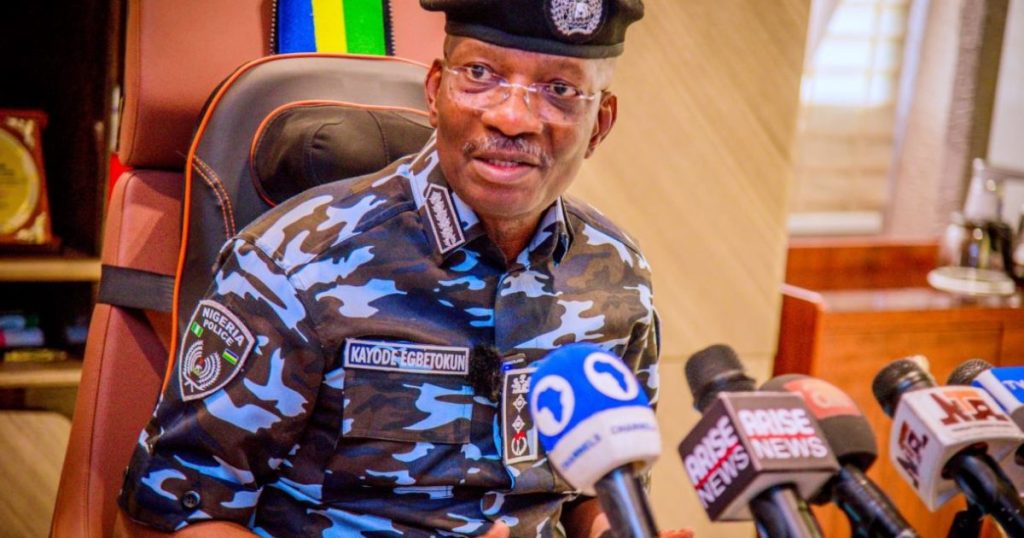The Inspector-General of Police, Kayode Egbetokun, has vehemently denied allegations of security agency involvement in manipulating election outcomes in Nigeria. He categorized such claims as baseless and unjust, emphasizing the police force’s neutrality during electoral processes. Speaking at the National Democracy Stakeholders Summit, Egbetokun, represented by Commissioner of Police Adewale Ajao, clarified that the police’s role is strictly confined to maintaining order and providing security for the electoral process, with no involvement in vote counting or influencing results. He stated unequivocally that the notion of police involvement in rigging is a fabrication, reiterating that they are neither participants nor referees in the elections. Their duty, he explained, is to oversee the process while the Independent National Electoral Commission (INEC) handles the collation of votes. This clarification comes in the wake of persistent controversies trailing the 2023 general elections, marked by accusations of irregularities from both the ruling and opposition parties.
The 2023 general elections, which saw Bola Tinubu of the All Progressives Congress (APC) emerge as President, were riddled with accusations of widespread irregularities, including violence, voter suppression, and rigging. Both Atiku Abubakar of the Peoples Democratic Party (PDP) and Peter Obi of the Labour Party, who trailed Tinubu in the vote count, rejected the results, citing these alleged malpractices. These allegations fueled a wave of distrust and skepticism about the integrity of the electoral process, with some quarters pointing fingers at security agencies, including the police. Egbetokun’s assertions aim to dispel these accusations and reaffirm the police’s commitment to upholding the sanctity of the electoral process. He highlighted ongoing efforts to enhance professionalism within the police force through collaborative training and capacity building initiatives involving INEC, civil society organizations, and the media.
Furthermore, Egbetokun tackled the growing discourse surrounding the right of citizens to bear arms. He cautioned against such a policy, arguing that it would exacerbate violence rather than curb it. He advocated for dialogue, tolerance, and community vigilance as more effective solutions to insecurity, stressing the importance of learning from other countries where similar policies have proven counterproductive. He emphasized that insecurity is a global challenge, and Nigeria’s share of the problem requires collaborative efforts, not an increase in the number of weapons in circulation. He believes that escalating violence with more violence is not a viable solution, and the focus should be on fostering peaceful coexistence and mutual responsibility within communities.
Dr. Kletsaint Akor, Chairman of the Proponent Council of the Nigeria Democracy Stakeholders Group, underscored the critical role of electoral legitimacy in sustaining Nigeria’s democracy. He pointed out that while technological advancements like the Bimodal Voter Accreditation System (BVAS) and electronic transmission of results were intended to enhance credibility, implementation gaps during the 2023 elections eroded public trust. He emphasized that elections are not merely concluding events but rather gateways to effective governance. Without legitimate elections, governance becomes a superficial performance rather than a productive endeavor. He advocated for the institutionalization of reforms, including granting INEC financial autonomy, ensuring transparent appointments of commissioners, and enforcing consequences for electoral malpractice, to strengthen the electoral process and restore public confidence.
Senator George Akume, the Secretary to the Government of the Federation, commended the Tinubu administration for initiating significant reforms despite facing challenging economic conditions and high public expectations. Represented by Permanent Secretary Nadungu Gagare, Akume stressed that the mid-term review should not be viewed as a mere formality but as a crucial democratic exercise in transparency and accountability. He highlighted the administration’s focus on reforms across key sectors within its first two years, contending that these interventions are establishing the groundwork for long-term national stability and inclusive growth. These reforms, according to Akume, demonstrate the government’s commitment to addressing critical national issues and laying the foundation for sustainable development.
In sum, the summit highlighted critical issues surrounding Nigeria’s democratic process, including the role of security agencies, the debate on citizens’ right to bear arms, the importance of electoral legitimacy, and the government’s reform agenda. The Inspector-General’s strong denial of police involvement in election manipulation sought to restore public trust in the force’s impartiality. The call for strengthening electoral processes through reforms underscored the need to address loopholes that undermine public confidence. Finally, the government’s commitment to reforms, despite economic challenges, signaled a focus on long-term national development and stability. The discussions at the summit reflect the ongoing efforts to consolidate Nigeria’s democracy and address the challenges that threaten its progress.


